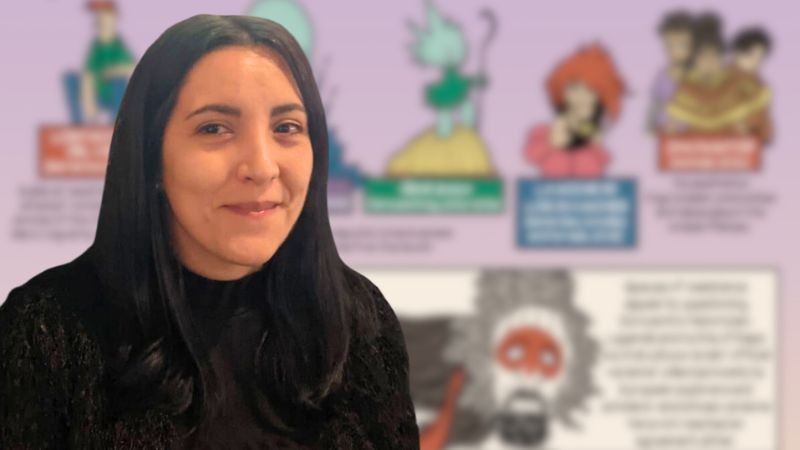A Mapuche Superman? PhD Student Researching Latin American Comics’ Mix of Western, Indigenous Roots
GSAS' Javiera Irribarren is researching Transmedia & Graphic Narratives, New Media & Latin American Science Fiction Literature.
Javiera Irribarren is a teaching fellow and a PhD student at Columbia’s Department of Latin American and Iberian Cultures (LAIC) at the Graduate School of Arts and Sciences (GSAS), where she is researching Transmedia and Graphic Narratives, New Media and Latin American Science Fiction Literature – particularly, South American comics.
“My dissertation is about science fiction comics in South America, focused on Chile and Brazil,” she says. “It’s comparative research about trends and topics that I identified in the last years on contemporary comics. Most of the chapters are about the imaginary, popular beliefs in terms of politics, and interventions in each of the countries.” Use this link to access a summary of Irribarren’s dissertation and a sample image of the literature she is researching.
In Chile, there are new comics that have been produced since the early 2000s that mix US- or European-based science fiction – superheroes – with the local Indigenous consciousness. “In Chile, these are Mapuche superheroes, or characters with Selk’nam features; there are many reinventions from western science fiction,” she notes.
The movement turns mainstream comics into indigenous and mestizo knowledge, establishing a dialogue between Western and Indigenous roots while recovering the Aymara, Selk’nam, Mapuche and Rapa Nui cultures.
Also in Chile, Irribarren is working with comics that cover the “Dorado” imaginary in science fiction - an event where a specific material is found that saves the future, producing endless energy. “It’s a future that’s industrialized, where they will replace carbon emissions, or they find a material that will change the sources to produce energy,” she explains. “But the comics also deal a lot with politics, like the political situation from the early 2000s and the struggle between a capitalist system and neoliberal strategies, and how it works in reality, or a utopian vision that could be good for the earth’s future.”
Comics that she has researched in Brazil also address recent or current political issues the country has experienced, but placed in a future scenario. “They criticize the current system in Brazil, the precariousness of labor or issues with the land. So for example, in this dystopian future society there are not just flying cars and huge skyscrapers. This whole system was built up in a precarious way with delivery and business apps, with no social security or health, and pensions are jeopardized. They put these issues in tension and it’s related to the tension that’s ongoing in Brazil, as well as Chile,” she says.
Other comics can focus on specific areas, such as Sao Paulo or even in the dry northeast region of Brazil, imagining the future and how they struggle with ongoing issues.
Also, Brazil’s comics sector has been growing since the 1970s. “They try to replicate the US or European comics that add Brazilian elements, these are national comics. It’s very clear, they are trying to build an industry and trade in Brazilian comics that are addressing a genre that covers fantasy, science fiction, and dystopian society, addressing legends and stories involving the local imaginary,” according to Irribarren.
“The regional imaginaries differ, depending on the identity of the people. There are also right-wing comings that have come out in the last few years, so it’s interesting to see the ideas that Brazilians have in representing themselves, from the Amazon to superheroes in Rio de Janeiro’s favelas,” she adds.
Some of the comics authors have attained a surprising international reach, according to the PhD candidate, with examples including Brazilian authors being translated into Polish as they have a number of devout readers in Poland, or Chilean works being translated into Portuguese.
Irribarren calls the literature she researches “graphic narratives” because they do not always take the form of a traditional comics magazine or newspaper publication. Some are published digitally while others can be experimental, such as one long page with just images and no text, or the opposite. “These are Latin Americans forming their own comics space,” she says.
Regarding future plans, Irribarren acknowledges she loves to teach. “I got into this as a high school teacher, which I did for a long time in Chile. I was always involved in science fiction research, the relationship between literature and cinema. For the high school students, it was easier to introduce literature through these comics, to engage them with novels… My students liked it when I talked about it, and academia in science fiction is rare. And comics and science fiction is even more rare,” she says.
Once obtaining her PhD degree, she plans to use her research to crate syllabi to teach undergraduate courses in the US.
Irribarren holds a Master’s in Literature from Chile’s Universidad Católica, where she also double majored in Hispanic Literature and Aesthetics. She is a member of Graphic Narrative Research Network, RING-Chile.
